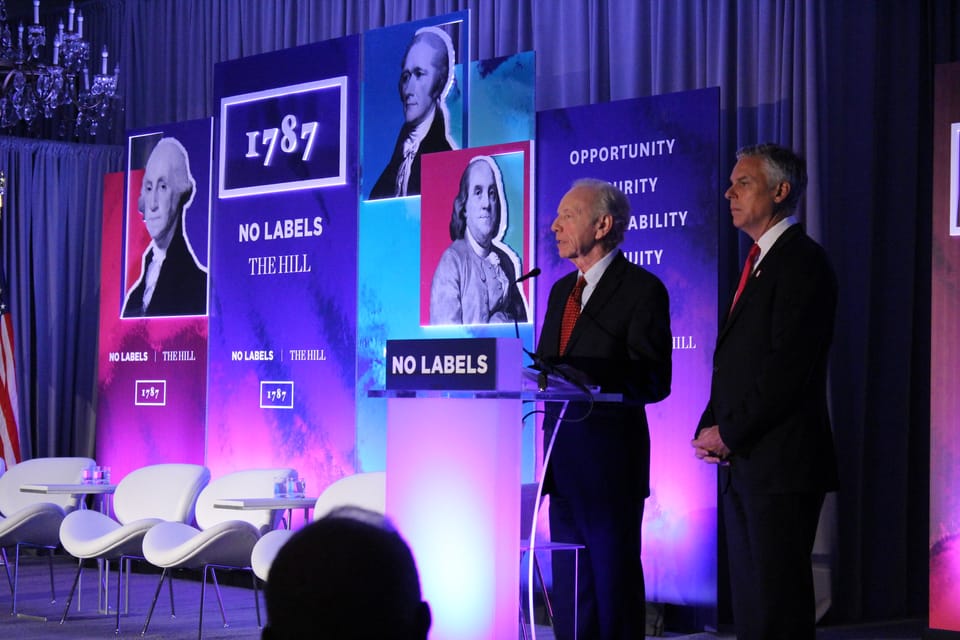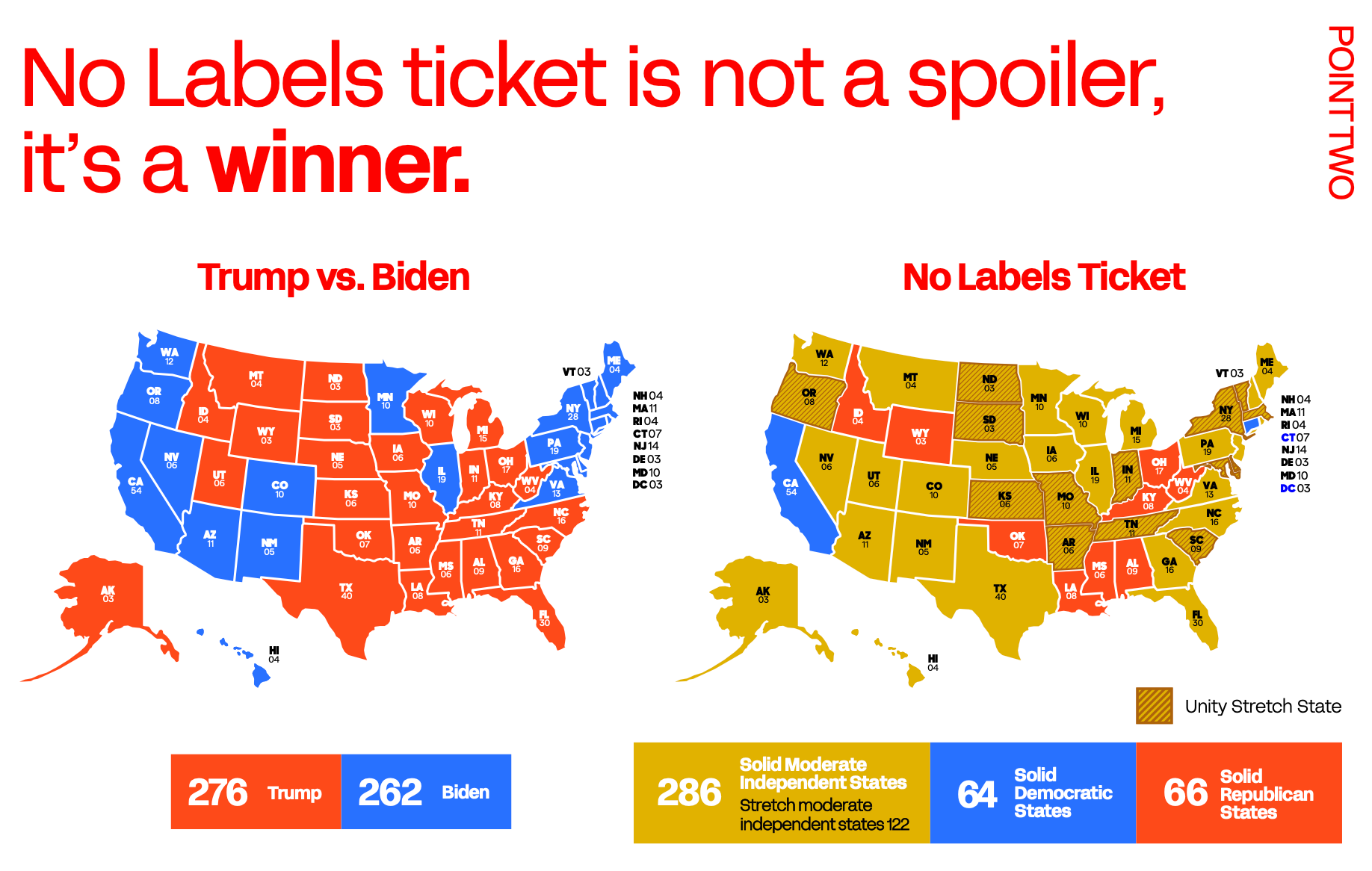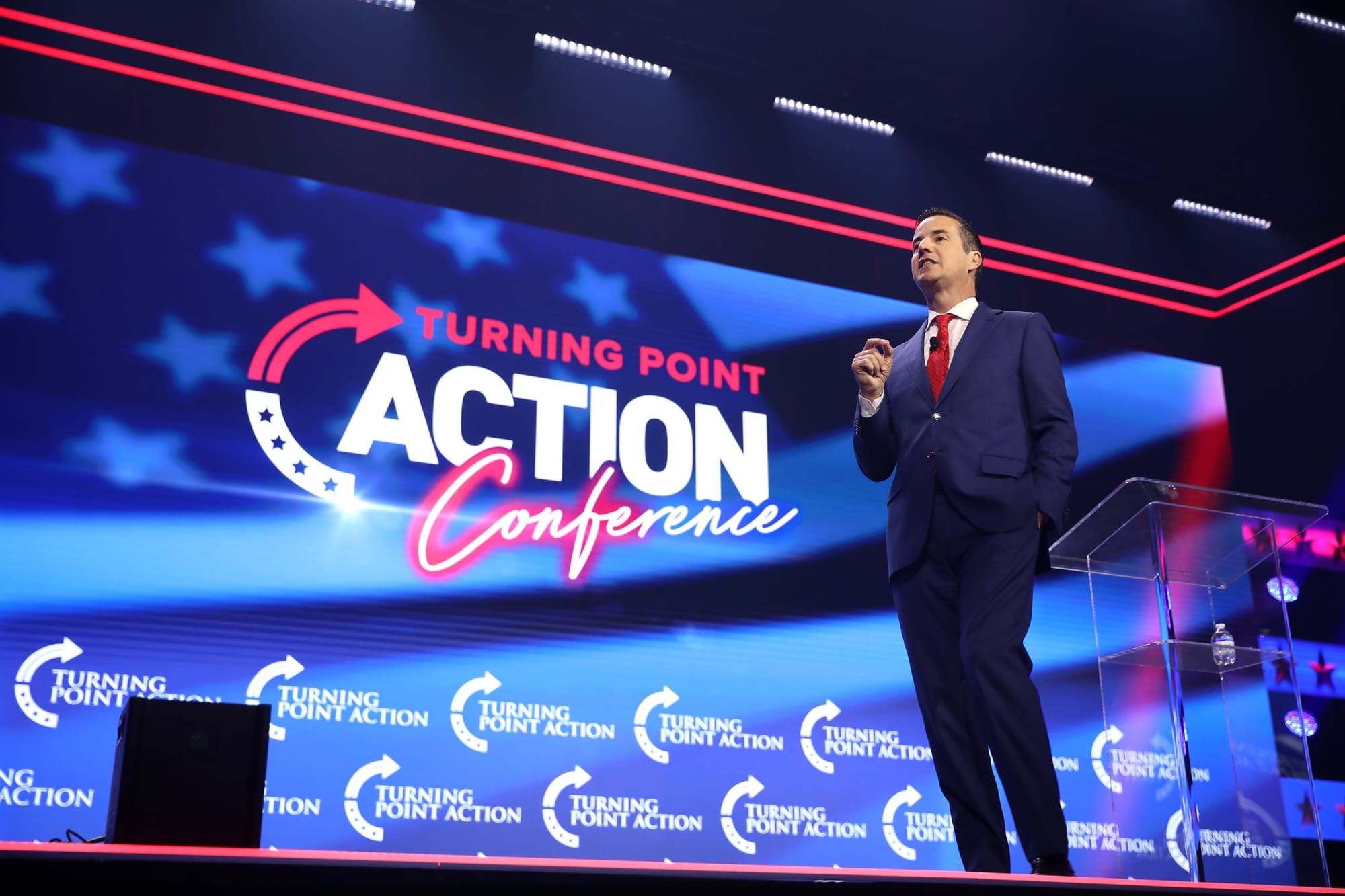No Labels is running out of options

Good morning! It’s Tuesday, March 19, 2024. Election Day is 231 days away. If this newsletter was forwarded to you, subscribe here. If you want to contribute to support my work, donate here.
The 2024 presidential field is already plenty crowded. Not only is there Donald Trump and Joe Biden — much to everyone’s delight — but the ballot is also poised to include an unusual number of prominent third party options, including Jill Stein, Cornel West, and Robert Kennedy, Jr.
A sixth contestant may be about to join stage-center: the No Labels ticket.
Originally founded in 2010 to promote bipartisanship in Congress (including through the fracturing House Problem Solvers Caucus), No Labels is wading into the presidential waters for the first time this year. For months, the group has publicly toyed with the idea of fielding a bipartisan “unity ticket” — with one Republican and one Democrat — in order to give Americans fed up with Trump and Biden another option. Now that the duo have become the two major party presumptive nominees, No Labels is moving full steam ahead.
The organization virtually convened 800 delegates earlier this month, who voted in favor of moving forward with a presidential campaign. Last week, a 12-person vetting committee was appointed; they will recommend the “unity ticket” candidates, who will then be approved by a vote of the delegates. Former Sen. Joe Lieberman (I-CT), a No Labels co-chair, told CNN that the ticket could be unveiled as soon as this Thursday.
The only issue? They can’t seem to find anyone willing to run.
The “unity ticket” received its latest blow Monday, when former Georgia Lt. Gov. Geoff Duncan (R), who had been publicly floated as a potential No Labels candidate, removed himself from consideration.
“After careful deliberation, I have withdrawn my name from consideration for the No Labels presidential ticket,” Duncan said in a statement. “It was an honor to be approached, and I am grateful to all those who are engaged in good-faith efforts to offer Americans a better choice than the Trump vs. Biden rematch.”
Duncan is only the latest in a string of prominent centrist politicians who have spurned No Labels’ efforts to court them for a third-party run. Here’s a sampling:
“I know that they have sent smoke signals, but I’m a Republican.” — former presidential candidate Nikki Haley
“He’s not running outside the Democratic Party.” — aide to former Democratic presidential candidate Dean Phillips
“I will not be seeking a third-party run. I will not be involved in a presidential run.” — Sen. Joe Manchin (D-WV)
“I’m not running for president.” — Sen. Kyrsten Sinema (I-AZ)
“I was never seriously considered to be their candidate. It was reported in the press otherwise, but I was never seriously considered... The answer is no.” — Sen. Bill Cassidy (R-LA)
Other potential candidates who have declined their entreaties include Gov. Brian Kemp (R-GA) and former Gov. Larry Hogan (R-MD), who is instead waging a run for the Senate.
As the search for a candidate continues, questions remain about the goals of the bipartisan campaign. The Atlantic’s John Hendrickson reported last month that, even within No Labels, a lack of clarity reigns.
“We are in this to win it,” No Labels’ chief strategist, Ryan Clancy, told Hendrickson. But Nancy Jacobson, the group’s CEO, stepped in with a correction: “I just want to clarify, this organization is not in it to win it. This organization is in it to give people a choice.”
The group has released maps suggesting that it could win 286 electoral votes, more than the 270 needed to win the White House. But such an outcome is extremely unlikely, to say the least. No third-party candidate since George Wallace in 1968 has won a single electoral vote — much less enough electoral votes to win the presidency.
A recent USA Today/Suffolk poll found a No Labels ticket fetching 1.9% of the vote nationally, behind Trump (40%), Biden (37.5%), Kennedy (8.7%), and West (2.4%) but just ahead of Stein (1.8%).

Democrats — who have raised suspicions about the organization’s funding — are gearing up for the possibility of a No Labels candidate taking votes from Biden, setting up a war room to confront No Labels and the other third-party candidates.
Meanwhile, the greatest obstacle to a No Labels candidate — or for any third-party campaign — will likely be ballot access. As of this week, the group has secured ballot access in 18 states, totaling a maximum of 147 electoral votes, far from enough to win the White House.
More news to know.

Primary voters in Ohio and Illinois will head to the polls today. The marquee race is the Ohio Republican Senate primary, where Trump-backed businessman Bernie Moreno, state Sen. Matt Dolan, and state Secretary of State Frank LaRose are competing for the right to take on Sen. Sherrod Brown (D-OH) in November. The contest was upended at the last minute by a report that Moreno’s email was linked to a profile seeking “Men for 1-on-1 sex” on an adult website in 2008. (His campaign says the profile was created by an intern as a joke.)
Donald Trump is facing an array of money problems. Personally, he is struggling to post the $464 million bond in his civil fraud case, after being spurned by all 30 brokers he approached. (The money is due by the end of the month.) Politically, his campaign is having issues attracting donors large and small, partially due to concerns by GOP megadonors that their contributions will be used to pay down Trump’s legal fees.
- Related: Trump is eyeing Vivek Ramaswamy for a Cabinet post and Kevin McCarthy for chief of staff in a second term... “Trump is making the Jan. 6 attack a cornerstone of his bid for the White House” (AP)... “Trump says any Jewish person who votes for Democrats ‘hates their religion’ and ‘everything about Israel’” (CNN)
Former Trump adviser Peter Navarro is scheduled to turn himself into federal prison today, after Chief Justice John Roberts rejected his last-ditch appeal. Navarro was convicted of contempt of Congress after refusing to cooperate with the House January 6th committee.
- Also at the Supreme Court: “Supreme Court leans against limiting Biden administration contacts with social media platforms” (NBC)... “Supreme Court extends block on Texas law that would allow police to arrest migrants” (AP)... “Supreme Court lets ‘insurrectionist’ ban against New Mexico official stand” (Politico)
President Biden spoke with Israeli prime minister Benjamin Netanyahu for the first time in over a month on Monday. According to the White House, Biden warned Netanyahu that a ground invasion of Rafah, Gaza’s southernmost city, would be a “mistake”; Netaynahu agreed to send a high-level delegation to Washington to discuss the issue.
- Related: “Israel and Hamas start detailed hostage negotiations for first time in months” (Axios)... “White House confirms Israel killed Hamas No. 3 in strike last week” (Times of Israel)
Congressional leaders have inked a government funding deal ahead of Friday’s shutdown deadline. Call it “functional dysfunction.”
More headlines:
- EPA bans last form of asbestos used in United States (CNN)
- Lawsuit accuses NYC Mayor Eric Adams of sexually assaulting a woman in a vacant lot in 1993 (AP)
- The Department of Homeland Security Is Embracing A.I. (NYT)
- Justice Breyer, Off the Bench, Sounds an Alarm Over the Supreme Court’s Direction (NYT)
- “Obama would be jealous”: How Biden's rivalry with his ex-boss shapes his presidency (Axios)
- On Fox News, Steve Doocy has become the unexpected voice of dissent (WaPo)
The day ahead.
White House: President Biden will travel to two battleground states, Nevada and Arizona, for campaign events. In Nevada, he will also deliver remarks on his new proposals aimed at lowering housing prices. VP Harris has nothing on her public schedule.
Congress: The Senate is set to vote on confirmation of Nicole Berner to be a U.S. Circuit Judge for the Fourth Circuit. The House is scheduled to vote on up to 10 bills by suspension of the rules. The House Foreign Affairs Committee will hold a hearing at 1 p.m. ET on the Afghanistan withdrawal, featuring former Joint Chiefs of Staff chairman Mark Milley and other witnesses.
Supreme Court: The justices will hear oral arguments in Diaz v. United States and Truck Insurance Exchange v. Kaiser Gypsum Company.
Thanks for reading.
I get up each morning to write Wake Up To Politics because I’m committed to offering an independent and reliable news source that helps you navigate our political system and understand what’s going on in government.
The newsletter is completely free and ad-free — but if you appreciate the work that goes into it, here’s how you can help:
- Donate to support my work or set up a recurring donation (akin to a regular subscription to another news outlet).
- Buy some WUTP merchandise to show off your support (and score a cool mug or hoodie in the process!)
- Tell your family, friends, and colleagues to sign up at wakeuptopolitics.com. Every forward helps!
If you have any questions or feedback, feel free to email me: my inbox is always open.
Thanks so much for waking up to politics! Have a great day.
— Gabe
